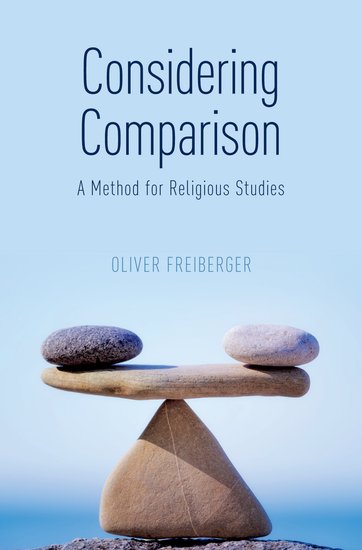by L. Nelson Leonard
L. Nelson Leonard: I worked with Dr. Freiberger over the past few months, assisting him as he developed the new experiential learning course for undergraduate students majoring in Religious Studies. As someone who primarily studies religion in contemporary American public life, it’s always so helpful for me to be exposed to scholars whose research areas are different from mine. Talking with Dr. Freiberger expanded how I conceptualize religion and the plurality of ways it can be categorized.
Oliver Freiberger, Considering Comparison: A Method for Religious Studies (New York: Oxford University Press, 2019).
LNL: How did you get interested in this research topic?

Dr. Freiberger: The comparative approach has always appealed to me. Already in graduate school I felt that comparison is at the heart of what religious studies is about. A theoretical analysis of empirical religious phenomena requires categories that are applicable to more than one case – that is, comparative categories such as, for instance, ritual, votive tablet, pilgrimage, cosmology, canon, or hybridity. To form, question, and refine such categories, we need comparison.
In my second book, The Asceticism Discourse in the History of Religions: A Comparative Study of Brahmanical and Early Christian Texts (2009; written in German), I focused on one comparative category – asceticism – and conducted a micro-comparison of certain Brahmanical texts (in Sanskrit) and early Christian texts (in Greek and Latin). The study enabled me to propose a new way to conceptualize “asceticism.” But while writing that book, I noticed that virtually no scholarly discussion existed about the actual method of comparison in the study of religion. My new book, Considering Comparison, is an attempt to fill that gap. It revisits the various critiques raised against comparison, dissects how comparison works, and offers a practical methodological framework for comparative studies.
LNL: What did you learn about religion during your research?
Dr. Freiberger: Probably my most fundamental insight was that “religion” – no matter how you define it – must be understood as a comparative category. Whenever scholars in religious studies call something (a practice, a concept, an institution) “religious,” they thereby assert the existence of other things that can also be called “religious” and may thus be compared to the former. Since “religion” is the primary concern of religious studies as an academic discipline – I’m making this case in chapter 1 – attention to how such categories are formed, called into question, and constantly adjusted through comparison must be a primary concern too.
Another important insight was that common critiques of the comparative method, especially its alleged decontextualization and essentialization, are often misplaced and/or stop short of addressing the deeper problem. If Jonathan Z. Smith’s suggestion is correct that religion (or rather, the concept “religion”) exists solely in the mind of the scholar, we need to figure out what’s going on in scholars’ minds! Analyzing the epistemological basis of comparison, Considering Comparison proposes a scholar-centered approach that calls for reflection upon personal, cultural, and academic factors that impact a scholar’s approach but also acknowledges the scholar’s agency within the disciplinary discourse.
Third, I realized that the comparative approach in religious studies is not confined to cross-cultural studies like my earlier work. Rather, comparison is much more prevalent – in fact, omnipresent – in all scholarship of religious studies. Some scholars of religion are more aware than others that they are comparativists, but I claim that in a fundamental way we all are. That’s why understanding how comparison works is so important. Reflecting upon one’s situatedness, upon the formation of one’s analytical categories, and thus upon the comparative underpinnings of one’s work is crucial to do responsible research in the study of religion. The book tries to make this case by discussing many concrete examples from scholarship on religion.
LNL: What do you hope readers learn from your book?
Dr. Freiberger: While all the points I discussed so far are important for appreciating the fundamental relevance of comparison, the primary goal of my book was to develop a methodological framework that helps scholars conduct comparative studies in a practical way, a framework that I wish I had at my disposal when I worked on my study on asceticism. Chapters 4 and 5 of Considering Comparison propose such a framework. It includes the configuration of a comparative study (modes, scales, and scopes of comparison) and distinguishes various operations in the research process. My hope is that readers realize that productive and responsible comparison is possible and fundamental for religious studies – and that they become inspired to pursue their own comparative work!
L. Nelson Leonard is a PhD student in the Religion in Society track at UT Austin’s Department of Religious Studies. She has training in political science and uses her interdisciplinary methodological skills to address cultural intersections of race and religion. You can learn more about her and her work here!
